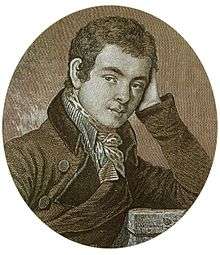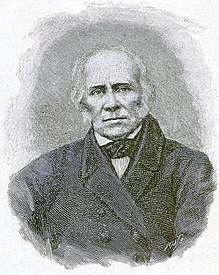Vasily Karazin
Vasily Nazarovich Karazin (Russian: Васи́лий Наза́рович Кара́зин; 30 January 1773 – 4 November 1842) was a Russian enlightenment figure, intellectual, inventor, founder of The Ministry of National Education in Russian Empire and scientific publisher. He is the founder of the Imperial Kharkov University (now V. N. Karazin Kharkiv National University).
Vasily Karazin | |
|---|---|
 | |
| Born | 30 January 1773 Kruchyk village of Sloboda Ukraine Governorate in Russian Empire (today Ukraine) |
| Died | 4 November 1842 (aged 69) |
| Nationality | Russian |
| Citizenship | Russian Empire |
| Known for | Founder of Kharkov University |
Biography

Karazin was born in Kruchik village, Kharkov Governorate, Russian Empire (now Ukraine), his father was Nazary Aleksandrovich Karazin, a Russian Imperial Army officer (noted for his involvement in Pârvu Cantacuzino's 1769 rebellion in Wallachia). His mother Varvara belonged to Russian nobility and was of partial Cossack starshyna ancestry.[1] Vasily Karazin considered himself to be ethnic Serbian, though his paternal family originally known as Karadji stemmed from Greek people.[2] He was married to Alexandra Karazina (née Mukhina) from Moscow, who was well known as one of Russian freelance translators of French literature into Russian; her stepfather was the Russian Imperial General major Egor von Blankennagel.
Vasily Karazin was educated in nobility schools in Kharkov and then in Kremenchug. At the age of eighteen, he left for Saint Petersburg, and underwent military training in the 1st Semyonovsky Independent Rifle Regiment. He also studied at the School of Mines, one of the top educational institutions in Russian Empire at that time. Karazin was, nevertheless, opposed to this environment, and often reacted against the manners and customs condoned by the nobility of the times. Unsatisfied with his military service, he moved back to his village and married a fourteen-year-old serf.
In 1798, Karazin attempted to leave Russia given his opposition to the policies of Russian Emperor Paul I, but was denied a passport. After he attempted to cross the border illegally, he was swiftly arrested.
When Alexander I took power, Karazin began petitioning him with his views on government development, pointing out the state's need to invest in education. In 1802 he obtained the tsar's permission to open a university in Kharkov. On 1 September of that year, during a meeting of the Kharkov nobility, he gave a famous speech on the benefits of a university, asking for voluntary donations. Lacking sufficient funding and academic supplies, Karazin underwent hardship in achieving his educational priorities. The local elite preferred a military college in the city.[1]
On 17 January 1805, the Kharkov University was opened; Karazin did not take part in the opening ceremony, as by that time he had lost his position with the Ministry of Education. According to Alexander Herzen, "the colossal ideas of Karazin were downscaled to a provincial German Hochschule".[3] Forced to return to his village, Karazin did not give up on all his plans and established a school for local children. In November 1808, Karazin wrote a letter to the emperor titled On non-intervention in European affairs for which he was arrested for the second time.
Karazin continued his academic work. He was a member of 7 academies, published more than 60 articles in different fields of science, primarily agriculture, pharmacology, chemistry, and physics. As an example of his innovative spirit, in 1810 in his village he opened Ukraine's first weather station.
Karazin repeatedly voiced critiques of what he viewed as Alexander's resistance to self-government and national education in the Russian Empire. Karazin was the founding father of the Ministry of National Education. His direct confrontation with Emperor Alexander I was so public, that in 1820–21 Karazin was even imprisoned in Shlisselburg Fortress. After that he lived in his family estate. Karazin died in Nikolaev.
The Russian painter and writer Nikolay Karazin was his grandson.
See also
- Kharkiv University (V. N. Karazin Kharkiv National University), University in Kharkiv named in his honour
- Andrej Dudrovich
- Atanasije Stojković
- Teodor Filipović
- Gligorije Trlajić
- Sava Petrović
- Đorđe Koritar
References
- What Makes Kharkiv Ukrainian, The Ukrainian Week (23 November 2014)
- Solovyev, Sergey (1976). History of Russia, Volume 46. Academic International Press. p. 210. ISBN 9780875691282.
- Hertzen A.I. Emperor Alexander I and V.N. Karazin From Hertzen in 30 volumes – Moscow, 1959. –v. 16. (in Russian)
External links
| Wikimedia Commons has media related to Vasilij Karazin. |
- (in Ukrainian and Russian) "An Enthusiastic 'Ukrainian Lomonosov'", Zerkalo Nedeli, #1(376), 5 January 2002 Available online in Russian and in Ukrainian.
- (in Ukrainian) Vasyl Karazin. Bibliography
- (in Russian) A.M Peskov Boratynsky